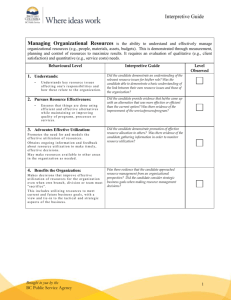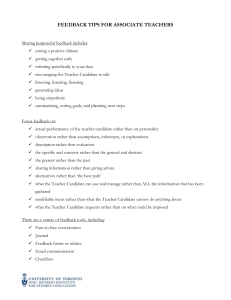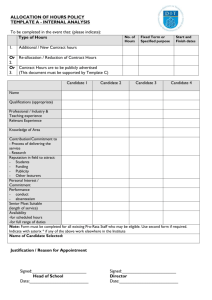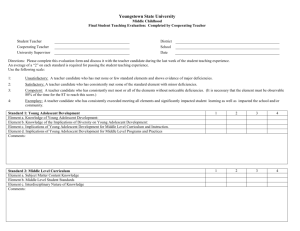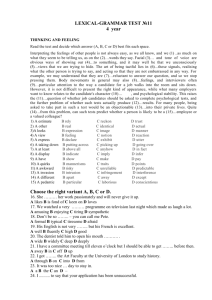Franks School of Education
advertisement
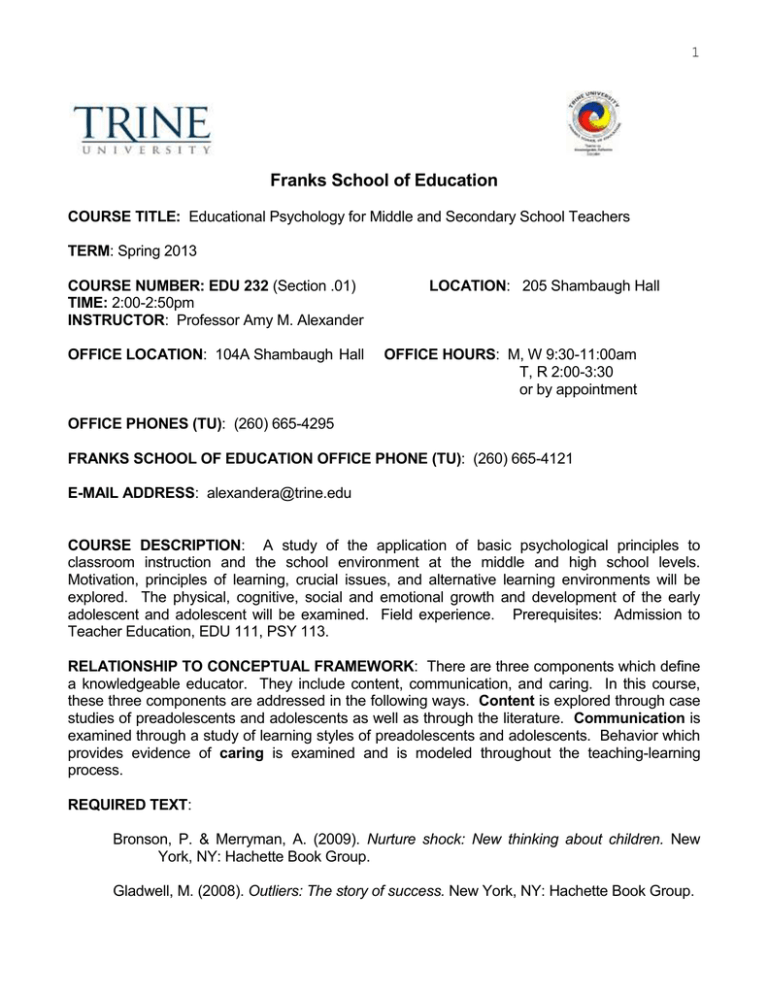
1 Franks School of Education COURSE TITLE: Educational Psychology for Middle and Secondary School Teachers TERM: Spring 2013 COURSE NUMBER: EDU 232 (Section .01) TIME: 2:00-2:50pm INSTRUCTOR: Professor Amy M. Alexander OFFICE LOCATION: 104A Shambaugh Hall LOCATION: 205 Shambaugh Hall OFFICE HOURS: M, W 9:30-11:00am T, R 2:00-3:30 or by appointment OFFICE PHONES (TU): (260) 665-4295 FRANKS SCHOOL OF EDUCATION OFFICE PHONE (TU): (260) 665-4121 E-MAIL ADDRESS: alexandera@trine.edu COURSE DESCRIPTION: A study of the application of basic psychological principles to classroom instruction and the school environment at the middle and high school levels. Motivation, principles of learning, crucial issues, and alternative learning environments will be explored. The physical, cognitive, social and emotional growth and development of the early adolescent and adolescent will be examined. Field experience. Prerequisites: Admission to Teacher Education, EDU 111, PSY 113. RELATIONSHIP TO CONCEPTUAL FRAMEWORK: There are three components which define a knowledgeable educator. They include content, communication, and caring. In this course, these three components are addressed in the following ways. Content is explored through case studies of preadolescents and adolescents as well as through the literature. Communication is examined through a study of learning styles of preadolescents and adolescents. Behavior which provides evidence of caring is examined and is modeled throughout the teaching-learning process. REQUIRED TEXT: Bronson, P. & Merryman, A. (2009). Nurture shock: New thinking about children. New York, NY: Hachette Book Group. Gladwell, M. (2008). Outliers: The story of success. New York, NY: Hachette Book Group. 2 Medina, J. (2008). Brain rules: 12 principles for surviving and thriving at work, home, and school. Seattle, WA: Pear Press. Several additional readings will be required throughout the term and will be distributed in class as needed. PROGRAM OBJECTIVES The Franks School of Education at Trine University has adopted principles developed by the Interstate New Teacher Assessment and Support Consortium (INTASC) as program objectives. Additional Principles have been added to provide for the broad professional development of the knowledge reflective educator. 1. 2. 3. 4. 5. 6. 7. 8. 9. 10. 11. 12. The teacher candidate understands the central concepts, tools of inquiry, and structures of the discipline(s) he or she teaches and can create learning experiences that make these aspects of subject matter meaningful for students. The teacher candidate understands how children learn and develop, and can provide learning opportunities that support their intellectual, social and personal development. The teacher candidate understands how students differ in their approaches to learning and creates instructional opportunities that are adapted to diverse learners. The teacher candidate understands and uses a variety of instructional strategies to encourage students’ development of critical thinking, problem solving, and performance skills. The teacher candidate uses an understanding of individual and group motivation and behavior to create a learning environment that encourages positive social interaction, active engagement in learning, and self-motivation. The teacher candidate uses knowledge of effective verbal, nonverbal, and media communication techniques to foster active inquiry, collaboration, and supportive interaction in the classroom. The teacher candidate plans instruction based upon knowledge of subject matter, students, and the community and curriculum goals. The teacher candidate understands and uses formal and informal assessment strategies to evaluate and ensure the continuous intellectual, social and physical development of the learner. The teacher candidate is a reflective practitioner who continually evaluates the effects of his/her choices and actions on others (students, parents, and other professionals in the learning community) and who actively seeks out opportunities to grow professionally. The teacher candidate fosters relationships with school, colleagues, parents and agencies in the larger community to support students’ learning and well-being. The teacher candidate organizes and implements instruction for students based on an understanding of the caring ethic. The teacher candidate understands and applies interpersonal communication skills that support the caring ethic. 3 LEARNING OUTCOMES: As a result of the experiences you will have in this you will— 1. 2. 3. 4. 5. 6. 7. 8. Identify physical growth characteristics of pre-adolescents and adolescents. (PO2, PO3, PO6, PO8) Identify social growth characteristics of pre-adolescents and adolescents. (PO3, PO5, PO6, PO8) Identify emotional growth characteristics of pre-adolescents and adolescents. (PO3, PO5, PO6, PO8) Identify cognitive growth characteristics of pre-adolescents and adolescents. (PO3, PO6, PO7, PO8) Analyze growth characteristics of selected pre-adolescents and adolescents (PO3) Describe factors related to teen pregnancy, teen suicide, teen substance abuse and teen violence and evaluate possible solutions to the problem. (PO1, PO3). Develop an understanding of the caring ethic and the interpersonal skills that support it in the context of pre adolescent/adolescent youth. (PO8, PO9) Discuss the impact of race and ethnicity on adolescent learning. (PO5) CANCELLED SCHOOL VISITS: If a school visit is scheduled and then cancelled, CLASS WILL MEET IN THE REGULARLY SCHEDULED PLACE AT THE REGULARLY SCHEDULED TIME. Listen to radio station WLKI (100.3 FM) or to WOWO (1190 AM) for school closings and delays. Angola schools are the same as MSD of Steuben County Schools. CLASSMATES: Get to know others in the class from whom you may get information if you should miss a class or need information and are unable to get in touch with me. Name: Phone: Name: Phone: COURSE REQUIREMENTS: Your general requirements for the term are listed here. Each requirement will be explained in greater detail. 1. ATTEND CLASS 2. Participate in and complete in-class activities. 3. Share ideas and experiences with the class. 4. Satisfactorily complete three case studies and give a brief presentation to the class (70 points). The Case Study is a required TaskStream artifact. 5. Complete assigned postings and reflections of class discussions and readings. 4 GRADE DETERMINATION: Your grade for this course will be based on the extent to which you satisfactorily complete the entire course requirements listed above. Activities will be assigned a point value. The total number of points you earn compared to the total number of points possible will be used to determine a percentage. Your final grade will be based on this percentage scale: A= 100-92; B+= 91-88; B= 87-84; C+= 83-79; C= 78-74; D= 73-69. ATTENDANCE: Attendance at class or at your field assignment is EXTREMELY IMPORTANT and is EXPECTED. Should more than the number of classes scheduled for one week (one session) be missed, your grade will be lowered accordingly. For example, if you miss one class, your grade will NOT be lowered for attendance reasons. If you miss a second class, your grade will be lowered one whole step (A/B). If you miss a third class, your grade will be lowered another whole step (A/B/C), etc. Arrangements for special circumstances will be made on an individual basis. Such arrangements should be made during a conference. If you know you will miss a class, make the necessary arrangements before the absence. NO SCHOOL VISIT MAY BE MISSED. IN-CLASS ACTIVITIES: If you miss an in-class activity, you may not make it up after the fact. If you are excused by the University, you may make arrangements to complete the activity or an equivalent assignment before the scheduled absence. SUGGESTED READINGS: There are two excellent educational journals available to you in the School of Education office (actually, in Dr. Van Wagner’s office). These journals are Phi Delta Kappan and Educational Leadership. Often, there are articles on adolescent issues. Highly recommended reading! Ask me about them and I’ll see to it that you have access to them. REQUIRED ACTIVITES: You should complete all of the required activities and submit each the day it is due. An activity sheet explaining each will be distributed prior to the due date. Some of the required activities are listed below. TERM PROJECT: Three case studies must be completed. A middle grade female/male, a regular high school female/male, and an alternative school female/male should be interviewed. A presentation will be made to the class. The Case Study due date is TBA. A detailed description of this term project will be distributed in an early class session. This project is to become an electronic portfolio artifact in TaskStream! VISITATION PROCEDURE: You should follow these basic procedures whenever you are a Trine University student participating in a school. 1. Be prompt. Do not arrive at the last minute. Try to arrive five minutes early. Allow ample time to get to the school. 2. Report to the school office when you arrive. Let them know you are in the building. 3. Enter the classroom quietly and take a seat at the back. Complete your assigned task and leave at the appropriate time. 4. If it is convenient at the conclusion of your visit, thank the teacher for having you in the classroom. 5. Dress professionally. If you don’t know what that means, ask the professors. 6. Call one of us and the school office if you cannot attend a scheduled visit. Meet with one of us as soon as possible to plan what you will do to complete the visit. There are very few excuses for missing a school visit. 5 IMPORTANT PHONE NUMBERS: Phone numbers of the area schools are listed here. Angola High School Angola Middle School Fremont High School Fremont Middle School Prairie Heights High School Prairie Heights Middle School Hamilton Junior-Senior High School Educational Opportunity Center (Mr. Steve Grill) (Mrs. Ann Rice) (Mr. Mark Sherbondy) (Mr. Mark Fowerbaugh ) (Ms. Donel Housel) (Mr. Jeff Reed) (Mrs. Barbara Weber) (Mrs. Lisa Peters) 665-2186 665-9581 495-9876 495-6100 1-800-800-9596 1-800-800-9596 488-2161 665-1360 SPELLING AND GRAMMAR: You are expected to use proper spelling and grammar at all times. Points will be deducted for improper use on written assignments (2 errors = -½ point; 3 errors = -1 point). TRINE UNIVERSITY CURRENT JOURNAL SUBSCRIPTIONS: The library currently receives or has online access to the following publications which may be helpful to education students. Articles are also available through interlibrary loan. The American Biology Teacher Art Education Arts and Activities Childhood Education Education Week Educational Leadership English Journal Instructor Journal of Learning Disabilities Journal of Research in Childhood Education Journal of Teacher Education The Mathematics Teacher Middle School Journal Phi Delta Kappan The Reading Teacher School Arts Science and Children Social Education Social Studies and the Young Learner Teaching Children Mathematics Teaching Pre-K – 8 The library phone number is 260.665.4162. 1 Tentative Class Schedule/Topics Class Dates 1-9 Topic Intro to the Course 1-14 Neurobiology 1-16 Neurobiology 1-23 Physical Development 1-28 Psychosocial Development 1-30 Psychosocial Development 2-4 2-6 2-11 2-13 Gender and Social Development Gender and Social Development (Catch up day) Field Trip to EOC for case study interview 2-18 Social Development and Learning 2-20 Emotions and Learning 2-25 Emotions and Learning 2-27 Emotions and Learning 3-11 (Catch up day) 3-13 Neurobiology of Learning 3-18 3-20 3-25 Neurobiology of Learning Neurobiology of Learning Neurobiology of Learning 3-27 Cognitive Development 4-1 4-3 Cognitive Development Reading Assignment to be Completed Assignment Due Development of the Teenage Brain Handout Vocabulary list on your wiki Complete vocab on Ed Psych wiki Science of Teen Rebellion (Nurture Shock, Ch. 7) Gender (Brain Rules, Ch. 11) Psychosocial Development wiki posting Reflection The Trouble with Geniuses (Outliers, pp. 69-73, 91-110) Stress (Brain Rules, Ch. 8) Emotional/ Moral Development wiki posting Mind, Brain, & Education Ch. 4 Handout Reflection Short-term Memory (Brain Rules, Ch. 5) Long-term Memory (Brain Rules, Ch. 6) Reflection Attention (Brain Rules, Ch. 4) Cognitive Development wiki posting Reflection 2 Case Study Discussion 4-8 (Catch up day) 4-10 Movie analysis 4-15 Movie analysis 4-17 Case study work day 4-22 Case Study Presentations 4-24 Case Study Presentations 4-29 Final Exam 5-1 Grading: Neuroscience vocabulary = 15 points 3 wiki matrix postings at 5 points each = 15 points 5 reflections at 10 points each = 50 points Case study presentation = 20 points Case study paper = 70 points Final exam = 30 points Attendance and participation = 30 Total points = 200 A = 184 points B+ = 176 points B = 168 points At the Core of the Apple Store Reflection C+ = 158 points C = 148 points D = 138 points



